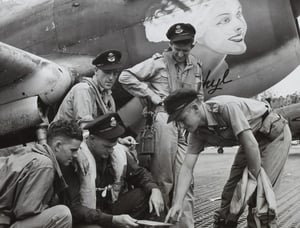Perseverance is hardly a fashionable or glamorous thing to talk about. In today’s culture, what is valued is speed. Instant gratification, next day shipping and getting our answers from Alexa are the way we expect to live our lives.
That is one of the reasons why we are feeling such a major emotional upset as we live during pandemic conditions. We expect bad things to be addressed and resolved very quickly. We expect answers right away. And we want the pandemic to be over—now!
It has been decades since the United States dealt with a long-term struggle that touched everyone and massively disrupted everyone’s lives for a long period of time. In fact, as 2020 is the 75th anniversary of the end of World War II, I would argue that the war in which the U.S. participated from late 1941 through the middle of 1945 was the last time everyone was called upon to persevere.
What did people experience back then? It was a combination of deep personal loss and sacrifice coupled with financial and material deprivation.
 People sent their loved ones off to war in faraway lands and did not see them for years—if they came back at all. If they were killed, they often were buried in the countries in which they died. Families were denied funerals for their loved ones. Weddings were hurried affairs. Once boys reached the age of 18 they were taken from their high school classrooms and shipped away. There were no high school graduations for them.
People sent their loved ones off to war in faraway lands and did not see them for years—if they came back at all. If they were killed, they often were buried in the countries in which they died. Families were denied funerals for their loved ones. Weddings were hurried affairs. Once boys reached the age of 18 they were taken from their high school classrooms and shipped away. There were no high school graduations for them.
The people left behind endured business losses that in some cases put them out of business. For one example, in January 1942 the unsold inventories of cars on the lots of all automobile dealers in the United States were frozen. The government dictated who was allowed to buy those cars (doctors and clergy to be specific). Once all of the cars were sold there was no more inventory until 1946. Many car dealers went out of business as a result.
People also endured material sacrifices. Coffee and other food products were rationed and sometimes availability was limited. From 1942 to 1945, automobile owners would be allotted 3.5 gallons of gasoline each week. They received their ration coupons IF they certified that they owned no more than five automobile tires. Every tire they owned above five was confiscated by the U.S. Government. And nationally the speed limit was set as 35 miles per hour as a way to conserve both gasoline and rubber tires.
Can you imagine what it was like to live during that time?
I am sure that by 1943, people were really sick of it. But the war was not over. They had to persevere. They had good days and bad days. They saw bad things happen to good people. Ultimately, they kept their eyes on the prize— win the war.
We did win the war. The service personnel came home throughout the second half of 1945 and well into 1946. It took several years to assimilate the soldiers back into the workforce. Unemployment was high. It was the early 1950s before industries recovered such that new cars and consumer goods were readily available. The war, and subsequent return to normal, stretched out for almost a decade.
The experiences that people endured throughout World War II have some similarities to what we are going through during the COVID-19 pandemic.
People have endured fear about getting the illness or giving it to others. People have endured the loss of loved ones. Many of us have friends and family who have had COVID-19 and in some instances these loved ones have died. And many died alone. As did loved ones in long-term care or hospice facilities. Weddings and graduation gatherings were cancelled. Schools have been closed and parents have had to become home-school teachers.
 Many people have lost their jobs and business owners have suffered. Some have had to permanently close their businesses. Many people are facing financial hardships.
Many people have lost their jobs and business owners have suffered. Some have had to permanently close their businesses. Many people are facing financial hardships.
People have experienced shortages in household goods and some types of food. Supply chains for appliances, parts for automobiles, and other machinery have been broken and items are in short supply.
And overarching all of this is the uncertainty of how much worse it’s going to get and how long it will continue. When will it end?
It will end. We will win the COVID-19 war.
As leaders we must gather up the courage to face and accept the uncertainty and believe that we will get through this. History shows us that people are resilient in the face of long-term crisis. Your role in supporting your team during this time is critical. You must model a can-do attitude. You must model patience. You must help people get through one day at a time, day after day, through their good days and bad days.
Help them to keep their eye on the prize—winning the war.
World War II ended when it did because of an innovation. We await the COVID-19 innovation—the vaccine. We don’t know when it will arrive and when it will be distributed, but it will come.
Think about what your grandparents and great-grandparents endured in those many long days of the war. They believed they could make it. And they made it.
We’ll make it. And we will lead our teams to greater heights of innovation and personal growth as we persevere.
COMMENTS